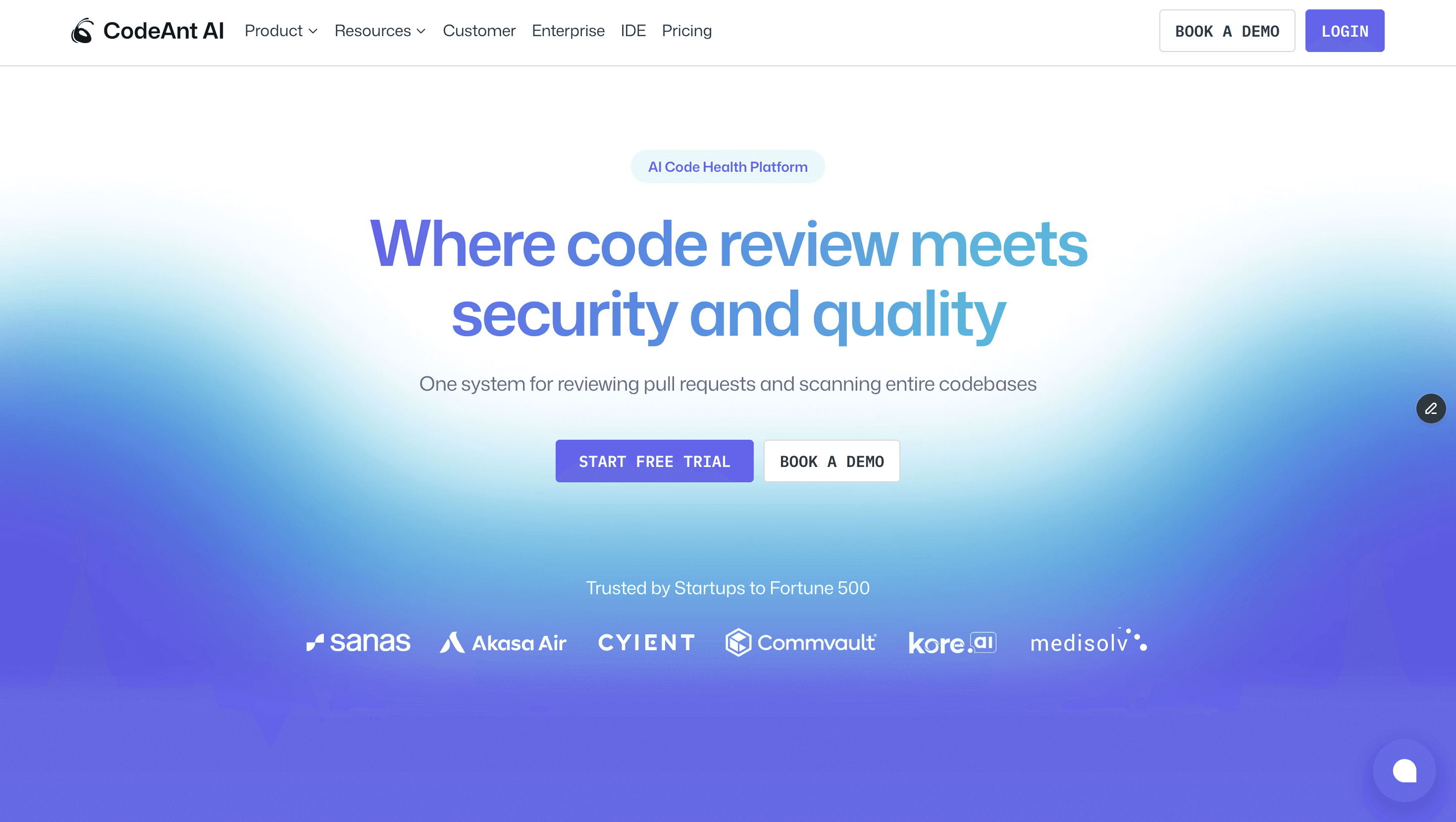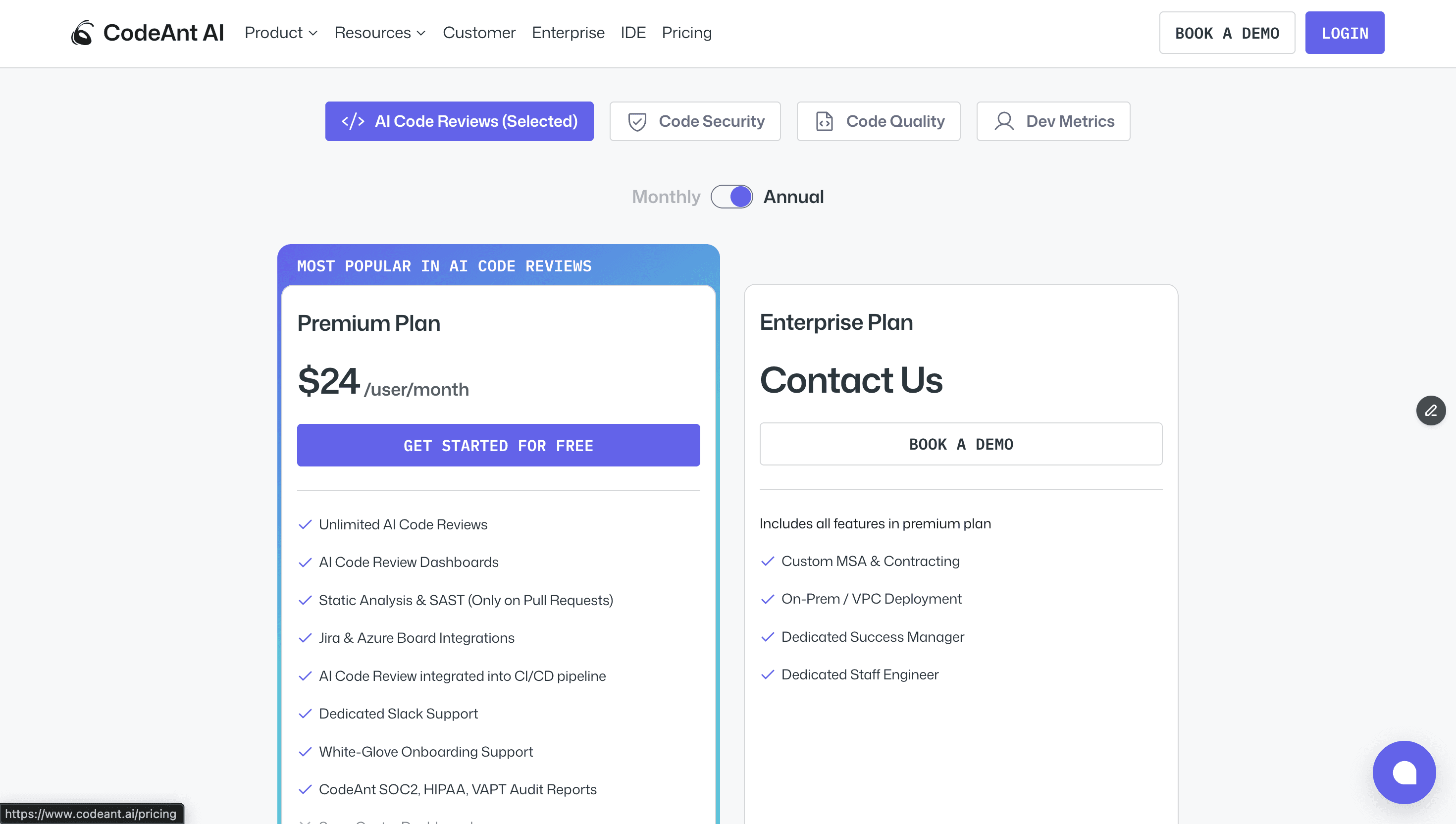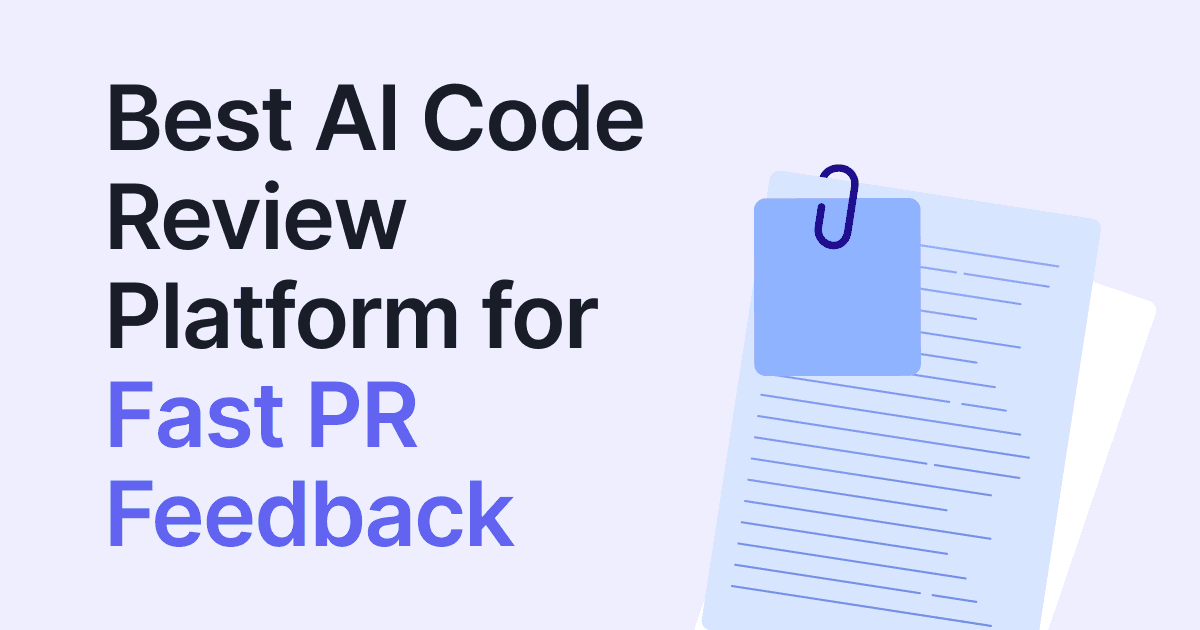AI Code Review
Dec 25, 2025
6 Bitbucket Code Review Tools Compared: What Works in 2026

Sonali Sood
Founding GTM, CodeAnt AI
Messy code reviews are the reason dev teams slow down. Code reviews help catch bugs, improve code quality, and increase learning among the team. But let's be real, manual code reviews are painful; it provides some in-built features for code review, but they are not enough (now automation and scalability issues). That's where Bitbucket code review tools or some add-ons come into the scene to take your workflow to another level.
In this blog, we will explore the best Bitbucket code review tools that will help you do some extra important things that Bitbucket doesn't support: save more time and money, improve code quality, and much more.
Why Use Bitbucket Code Review Tools
For many dev teams, BitBucket is the go-to platform for code reviews. It is designed to simplify collaboration but we know it is not perfect. To understand why code review tools are amazing, let's start with what BitBucket native features are and where it is falling.
Bitbucket Native Features
It is not that bad either; it has some good/basic feature for code reviews.
Pull Requests: You can create pull requests and discuss the code changes before merging them.
Inline comments: You can leave feedback directly on any specific line of code.
Branch Permission: You can control who can push the changes to which branches, security+++. Well, these are some basic features most of the version control tools provide.
Where Bitbucket Fails
But as projects grow and teams scale, you might notice some gaps in Bitbucket's native setup:
No Automation: Bitbucket doesn't automatically flag issues like bugs, outdated dependencies, or messy code. You will need to do all this manually.
Limited Analytics: Bitbucket doesn't give you detailed insights into review speed or risky areas in your codebase.
Basic Security: While branch permissions are good, Bitbucket doesn't scan your dependencies for vulnerabilities or catch risky patterns in your code.
Scaling Challenges: With larger teams, it's hard to maintain consistency in reviews, track feedback, or ensure standards are met.
How Code Review Tools Power-Up Bitbucket
You may think Bitbucket is good enough, but seriously, are you settling for that? By adding some great code review tools with Bitbucket, you can:
Automate the boring stuff: Tools mentioned in the lists can help you catch bugs, code smells, and vulnerabilities automatically; no manual work.
Increase security: These tools scan for vulnerabilities in your dependencies and suggest fixes.
Get detailed insights: Code review tools show risks in your codebase and suggest improvements
Speed up reviews: A solid foundation + adding third-party tools helps you work fast while maintaining higher standards.
Now with this, let's start taking a look at the tools. But, but, but…
Before you pick “whatever’s popular,” it helps to see what each Bitbucket code review tool actually adds on top of native PRs, inline comments, and branch protections.
Comparison of Bitbucket Code Review Tools
The table below compares the top Bitbucket code review tools on what they’re best for, what they add beyond Bitbucket, core features, setup effort, trade-offs, and pricing, so you can match a tool to your team’s workflow, scale, and security needs.
Tool | Best For | What It Adds Beyond Bitbucket | Core Features | Setup / Integration | Pricing* |
|---|---|---|---|---|---|
CodeAnt AI | Enterprises & DevOps teams | PR-native AI reviews, SAST + secrets, auto-summaries, custom policy rules | Line-by-line AI suggestions, secret & vuln scanning, security dashboards, custom rules, Slack/email alerts, cloud or on-prem | Native Bitbucket PR integration; works with Pipelines; quick install | 14-day trial; AI Reviews from $24/user/mo (Basic) |
Snyk | Teams focused on open-source dependency and IaC security | Automated dependency, container, and IaC scanning in PRs/Pipelines | SCA findings with fixes, Docker/K8s/Terraform checks, PR gates | Bitbucket Pipelines integration; policy gates | Free tier; paid from $25/user/mo |
SonarQube | Enterprises & DevOps teams | Static analysis with PR decoration & tech-debt tracking | Duplication/complexity/security rules, PR comments, dashboards | Cloud or self-hosted; Bitbucket PR decoration; some setup effort | Cloud: free basic; Team from $32/mo. Self-managed: from $160/yr (Developer) |
Crucible (Atlassian) | Process-heavy peer reviews and auditability | Structured review workflows, pre-commit reviews, Jira links | Assign reviewers, inline comments, review metrics, cross-repo reviews | Works well in Atlassian stack; connects to Bitbucket | 30-day trial; $10 one-time (≤5 users); scales to enterprise pricing |
CodeScene | Prioritizing tech-debt & risk, not just style issues | Behavioral/code-health analytics that flag “hotspots” | Hotspot & risk analysis, PR risk insights, team health metrics | Bitbucket integration for PR insights; light setup | Free for OSS; €18–€27/author/mo |
DeepSource | All-in-one static analysis with autofix | Automated issues + one-click fixes in PRs | Multi-language analysis, Autofix, security checks, custom rules | Bitbucket integration; quick to start | Free (solo/≤3 devs); paid from $8/dev/mo |
Now, you have taken a glimpse of these 6 best Bitbucket code review tools, let us walk you in detail.
1. CodeAnt.ai

If your Bitbucket code reviews feel like a bottleneck, CodeAnt AI might just be your fastest upgrade. It's built to plug directly into your pull request flow and take the grunt work out of reviewing code, without skipping on depth. Instead of just flagging issues, CodeAnt reviews each PR line-by-line, surfaces real bugs, security flaws, and code smells, and even suggests fixes. And yes, it's fully integrated with Bitbucket.
Key Features
PR-native reviews: It's real-time AI feedback right inside your Bitbucket PRs
Secret & vulnerability scanning: Flags exposed tokens, SAST issues, and third-party risks
Security dashboards: Track posture across repos, pull requests, and teams
Custom rules: Enforce team-wide code standards and policies
Slack/email alerts: Keep everyone in the loop instantly
Cloud or on-prem: Your call, depending on how you handle sensitive code
What Devs Like Most
No more vague alerts, just clear, actionable suggestions that make your codebase cleaner, faster, and more secure.
Pricing
14-day free trial, No credit card required. After that AI Code Reviews are: $24/user/month [Basic Plan], Premium plan starting from $20/user/month.

👉 Check out CodeAnt for Bitbucket
2. Snyk

Snyk is a powerful Bitbucket code review tool that sniffs out vulnerabilities in your project's dependencies. It specializes in open-source code security and detecting vulnerabilities.
Key Features
Dependency Scanning: Identifies vulnerabilities in your dependencies and provides AI suggestions.
Container and IaC Security: Scans Dockerfiles, Kubernetes configurations, and Terraform templates for security risks.
CI/CD: embeds within Bitbucket pipelines to block vulnerable builds.
Limitations
The free tier might be restrictive for larger projects or teams needing advanced analytics.
May require training for teams unfamiliar with DevSecOps workflows.
Pricing
The free plan is limited to open-source projects with basic features. Team and Business plans start at $25/user/month and custom pricing for enterprise plans.
3. SonarQube

SonarQube is a trusted name in the code review tools market; it integrates directly with BitBucket and helps in code quality management.
Key Features
Static Code Analysis: It can find issues like code duplication, security flaws, and maintainability challenges.
Pull Request Decoration: Adds comments to Bitbucket pull requests, summarizing issues and suggesting fixes.
Customizable Dashboards: Tracks project health and technical debt over time.
Limitations
Initial setup can be complex, especially for self-hosted deployments.
Advanced features like security analysis are behind higher pricing tiers.
Pricing
For cloud-based: free plan with basic features. The team plans to start at $32/month with unlimited users. And an enterprise plan with self-managed.
For self-managed: The developer plans start at $160/year and custom plans for Enterprise and Data Centers.
4. Crucible

Crucible by Atlassian is a powerful peer review tool that'll change how your team used to collaborate. It works seamlessly with BitBucket. The great part about this tool is that it keeps everyone on the same page and increases workflow.
Key Features
Peer Review Workflow: Enables teams to assign reviewers, comment inline on code, and track review progress.
Pre-Commit Reviews: Facilitates code reviews before changes are committed to the repository.
Integration with Jira: seamlessly links code reviews to Jira issues for better context and to track later.
Cross-Repository Reviews: Supports reviews across multiple Bitbucket repositories. Best for large teams.
Limitations
It is designed primarily for pre-commit workflows and may not fit all development models.
Best suited if your team is in the Atlassian ecosystem; if you are a standalone user, you cannot fully use it.
It is great for manual reviews but it lacks automation features, so if you are looking for AI-powered code analysis, this is not the right choice to make.
Pricing
Free for 30 Days and small teams $10 one-time payment for unlimited repos and up to 5 users and the plans go up to $17,000 for 2000 users.
5. CodeScene

CodeScene gives a unique approach to code reviews by combining code quality metrics with behavioral analysis. It helps the team to prioritize technical debt and focus on actual coding.
Key Features
Hotspot Analysis: Identifies high-risk areas in the codebase that frequently change and get issues.
Behavioral Analysis: analyzes team activity to predict areas that prone to defects due to unfamiliarity or rushed commits.
Pull Request Insights: Flags potential issues directly on Bitbucket pull requests. Also includes risks related to technical debt.
Team Health: metrics: tracks developer workload and collaboration patterns to ensure sustainable practices.
Limitations
It is overwhelming for small teams or projects without significant technical debt.
Focuses on broader codebase health rather than basic security vulnerabilities.
Pricing
Have free trial with standard plans starting at Euro 18/month/author and Pro plans from 27 Euros/month/author
6. DeepSource

Deepsource is like having a buddy who never sleeps. It is an all-in-one code review and static analysis tool that is directly integrated with BitBucket and improves code quality and automated routine checks.
Key Features
Automated Issue Detection: Scans for anti-patterns and security vulnerabilities and supports 12+ languages.
Autofix: Suggests fixes for detected issues so developers can resolve them
Security Analysis: Finds potential risks like SQL injections and cross-site scripting (XSS).
Custom Analysis Rules: Tailors your team's coding standards.
Limitations
Security scanning is not as extensive as dedicated tools like Snyk. Advanced features are limited to higher pricing tiers.
Pricing
Free for solo des and small teams (under 3 members) and Starter and Business tiers start from $8/mo, respectively.
How to Choose the Right Bitbucket Code Review Tool?
Here is a simple framework you can follow to find out how the tool works.
Needs First: What's your team's biggest pain point? Speed? Better collaboration? Automation? Pick a tool that solves your actual problems.
Must-Have Features: Look for basics like inline comments, Bitbucket integration, and automation for common issues. Skip tools with fancy extras you'll never use.
Team Fit: Get feedback from your team. If they don't like using it, no tool will work.
Try It Out: Most have free versions or trials. Test them before committing.
Budget Check: Free is great, but if a paid tool saves time or stress, it's worth it.
Conclusion: Power Up Your Bitbucket Code Reviews
Bitbucket gives you a solid foundation, but at scale its native reviews can’t keep up with today’s security, quality, and speed demands. Adding the right Bitbucket code review tools turns “manual PR checks” into an automated, insight-driven workflow. Whether you need AI-powered reviews, vulnerability scanning, or long-term code health tracking, the key is to pick the tool that fits your team’s pain points, try the free trials, and iterate. The result? Faster reviews, cleaner code, and fewer surprises in production.
So start small, test, and adjust.
Want to check out more tools? Read 6 GitLab code review tools to boost your workflow.
Happy Reviewing.














